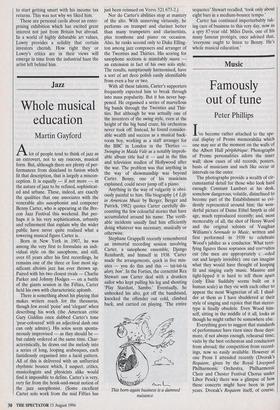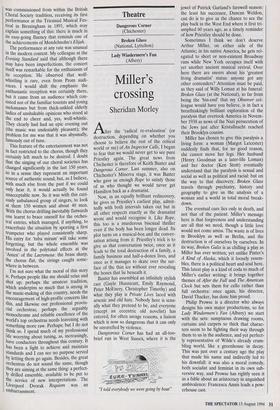Music
Famously out of tune
Peter Phillips
I've become rather attached to the spe- cial display of Proms memorabilia which one may see at the moment on the walls of the Albert Hall peripherique. Photographs of Proms personalities adorn the inner wall; show cases of old records, posters, busts of musicians and such like occur at intervals on the outer.
The photographs provide a wealth of cir- cumstantial detail for those who look hard enough: Constant Lambert at his desk, somehow dangerous, volatile, disinclined to become part of the Establishment so evi- dently represented around him; the won- derful picture of Dame Ethel Smyth in old age, much reproduced recently; and, most memorably of all, the shot of Henry Wood and the original soloists of Vaughan Williams's Serenade to Music, written and first performed in 1938 to celebrate Wood's jubilee as a conductor. What terri- fying figures those sopranos and contraltos cut (the men are appropriately c. ,wded out and largely invisible): one can imagine what they would have thought of keeping fit and singing early music. Massive and tight-lipped it is hard to tell them apart (only Elsie Suddaby seems built on a human scale) as they vie with each other to appear the most Wagnerian of all. I shud- der at them as I have shuddered at their style of singing and rejoice that that stereo- type is finally obsolete. Even Wood him- self, sitting in the middle of it all, looks as though he might rather be somewhere else.
Everything goes to suggest that standards of performance have risen since those days: more, if not always enough, rehearsal time; visits by the best orchestras and conductors from abroad; the competition from record- ings, now so easily available. However at one Prom I attended recently (Dvorak's Requiem, given by the Royal Liverpool Philharmonic Orchestra, Philharmonic Choir and Chester Festival Chorus under Libor Pesek) there was a glimpse of how these concerts might have been in past years. Dvorak's Requiem itself, of course, was commissioned from within the British Choral Society tradition, receiving its first performance at the Triennial Musical Fes- tival in Birmingham in 1891, which may explain something of this: there is much in its easy-going fluency that reminds one of the achievements of Mendelssohn's Elijah.
The performance at any rate was unusual in the modern context. My colleague at the Evening Standard said that although there may have been imperfections, the concert itself was remarkable for the enthusiasm of its reception. He observed that wolf- whistling is rare, even from Prom audi- ences. I would shift the emphasis: the enthusiastic reception was certainly there, but it came from an audience which con- sisted not of the familiar tourists and young melomanes but from thick-ankled elderly ladies of unshakable opinions who stood at the end to cheer and, yes, wolf-whistle. They clearly had had an epic evening out (the music was undeniably pleasant); the problem for me was that it was abysmally, famously out of tune.
This feature of the entertainment was not in fact restricted to the chorus, though they certainly left much to be desired. I doubt that the singing of our choral societies has changed significantly in the last 150 years, so in a sense they represent an important source of authentic sound; but, as I believe, with much else from the past if we could only hear it, it would actually be found unacceptable now. So it was with this curi- ously unbalanced group of singers, to look at them 150 women and about 40 men. With the chorus drifting inevitably flatwards one learnt to brace oneself for the orches- tral entries, which managed, if anything, to exacerbate the situation by sporting a first trumpeter who played consistently sharp. His entry for 'tuba minim' will take some forgetting; but the whole ensemble was involved in the polytonal effects at the `Amen' of the Lacymosa: the brass sharp, the chorus flat, the strings caught some- where in between.
I'm not sure what the moral of this story is. Perhaps people like me should relax and shut up; perhaps the amateur tradition, Which underpins so much that is strong in the music-making of this country, needs the encouragement of high-profile concerts like this, and likewise our professional provin- cial orchestras; perhaps the arguably monochrome and reliable excellence of the World's top orchestras needs leavening with something more raw. Perhaps; but I do not think so. I spend much of my professional life worrying about tuning, as, increasingly, have conductors throughout this century. It has been a fight to achieve and maintain standards and I can see no purpose served by letting them go again. Besides, the great orchestras do not sound the same, though they are aiming at the same thing: a perfect- ly drilled ensemble, available to be put to the service of new interpretations. The Liverpool Dvorak Requiem was an embarrassment.











































 Previous page
Previous page